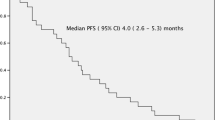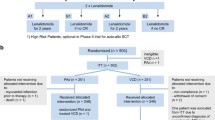Abstract
We conducted a phase 2 study with bortezomib, doxorubicin, and dexamethasone (PAD) followed by thalidomide and dexamethasone (TD) in patients with relapsed multiple myeloma (MM). Forty patients were enrolled between November 2005 and October 2007, with follow-up continuing until January 2009. Efficacy could be assessed in 37 patients. The overall response rate to PAD followed by TD was 83.6%: complete response 51.4%, near-complete response 13.4%, very good partial remission 5.4%, and partial response 13.4%. The median follow-up was 27 months (range 13–39). The median progression-free survival (PFS) from the start of treatment was 18 months (95% CI, 9.7–26.2 months), with a 1-year PFS rate of 56.9% and 3-year PFS rate of 25.7%. Median overall survival was 35.1 months (95% CI, 18.5–51.7), with a 1-year survival rate of 75% and 3-year survival rate of 27.3%. One hundred seventy-eight PAD cycles (median 6, range 1–6) in 38 patients were assessable for safety. The most common hematologic toxicity was thrombocytopenia, with grade 3–4 in 35.8%. Sensory neuropathy occurred at grade 2 in 26.3% and grade 3 in 10.3%. Two hundred TD treatment cycles (median 4, range 0–12 cycles) were administered. Most adverse events were of mild degree and manageable. PAD followed by TD in patients with relapsed MM is very effective and tolerable.



Similar content being viewed by others
References
Glasmacher A, Hahn C, Hoffmann F et al (2006) A systematic review of phase-II trials of thalidomide monotherapy in patients with relapsed or refractory multiple myeloma. Br J Haematol 132:584–593
Richardson PG, Blood E, Mitsiades CS et al (2006) A randomized phase 2 study of lenalidomide therapy for patients with relapsed or relapsed and refractory multiple myeloma. Blood 108:3458–3464
Richardson PG, Sonneveld P, Schuster MW et al (2005) Bortezomib or high-dose dexamethasone for relapsed multiple myeloma. N Engl J Med 352:2487–2498
Bladé J, Vesole DH, Gertz M (2003) High-dose therapy in multiple myeloma. Blood 102(10):3469–3470
Raikumar SV, Fonseca R, Dispenzieri A et al (2000) Thalidomide in the treatment of relapsed multiple myeloma. Mayo Clin Proc 75:897–901
Singhal S, Mehta J, Desikan R et al (1999) Antitumor activity of thalidomide in refractory multiple myeloma. N Engl J Med 341:1565–1571
Rajkumar SV, Hayman S, Gertz MA et al (2002) Combination therapy with thalidomide plus dexamethasone for newly diagnosed myeloma. J Clin Oncol 20:4319–4323
Weber D, Rankin K, Gavino M et al (2003) Thalidomide alone or with dexamethasone for previously untreated multiple myeloma. J Clin Oncol 21:16–19
Richardson PG, Barlogie B, Berenson J et al (2003) A phase 2 study of bortezomib in relapsed, refractory myeloma. N Engl J Med 348:2609–2617
Richardson PG, Sonneveld P, Schuster M et al (2007) Extended follow-up of a phase 3 trial in relapsed multiple myeloma: final time-to-event results of the APEX trial. Blood 110:3557–3560
Orlowski RZ, Nagler A, Sonneveld P et al (2007) Randomized phase III study of pegylated liposomal doxorubicin plus bortezomib compared with bortezomib alone in relapsed or refractory multiple myeloma: combination therapy improves time to progression. J Clin Oncol 25:3892–3901
Faith ED, Noopur R, Teru H et al (2001) Thalidomide and immunomodulatory derivatives augment natural killer cell cytotoxicity in multiple myeloma. Blood 98:210–216
Hideshima T, Chauhan D, Shima Y et al (2000) Thalidomide and its analogs overcome drug resistance of human multiple myeloma cells to conventional therapy. Blood 96:2943–2950
Joan B, Diana S, Donna R et al (1998) Criteria for evaluating disease response and progression in patients with multiple myeloma treated by high-dose therapy and haemopoietic stem cell transplantation. Br J Haematol 102:1115–1123
Weber DM, Chen C, Niesvizky R et al (2007) Multiple myeloma (009) study investigators. Lenalidomide plus dexamethasone for relapsed multiple myeloma in North America. N Engl J Med 357:2133–2142
Dimopoulos M, Spencer A, Attal M et al (2007) Multiple myeloma (010) study investigators. Lenalidomide plus dexamethasone for relapsed or refractory multiple myeloma. N Engl J Med 357:2123–2132
Ciolli S, Leoni F, Casini C et al (2008) The addition of liposomal doxorubicin to bortezomib, thalidomide and dexamethasone significantly improves clinical outcome of advanced multiple myeloma. Br J Haematol 141(6):814–819
Attal M, Harousseau JL, Stoppa AM et al (1996) A prospective, randomized trial of autologous bone marrow transplantation and chemotherapy in multiple myeloma. Intergroupe Français du Myélome. N Engl J Med 335:91–97
Child JA, Morgan GJ, Davies FE, Medical Research Council Adult Leukaemia Working Party et al (2003) High-dose chemotherapy with hematopoietic stem-cell rescue for multiple myeloma. N Engl J Med 348:1875–1883
Barlogie B, Tricot G, Anaissie E et al (2006) Thalidomide and hematopoietic-cell transplantation for multiple myeloma. N Engl J Med 354:1021–1030
Rajkumar SV, Dispenzieri A (2005) Evaluation and monitoring of response to therapy in multiple myeloma. Haematologica 90:1305–1308
Palumbo A, Gay F, Bringhen S et al (2008) Bortezomib, doxorubicin and dexamethasone in advanced multiple myeloma. Ann Oncol 19:1160–1165
Durie BG, Jacobson J, Barlogie B et al (2004) Magnitude of response with myeloma frontline therapy does not predict outcome: importance of time to progression in southwest oncology group chemotherapy trials. J Clin Oncol 22:1857–1863
Jagannath S, Richardson PG, Barlogie B et al (2006) Bortezomib in combination with dexamethasone for the treatment of patients with relapsed and/or refractory multiple myeloma with less than optimal response to bortezomib alone. Haematologica 91:929–934
Sonneveld P, Hajek R, Nagler A, DOXIL-MMY-3001 Study Investigators et al (2008) Combined pegylated liposomal doxorubicin and bortezomib is highly effective in patients with recurrent or refractory multiple myeloma who received prior thalidomide/lenalidomide therapy. Cancer 112:1529–1537
Oakervee HE, Popat R, Curry N et al (2005) PAD combination therapy (PS-341/bortezomib, doxorubicin and dexamethasone) for previously untreated patients with multiple myeloma. Br J Haematol 129:755–762
Author information
Authors and Affiliations
Consortia
Corresponding author
Additional information
Sung Sook Lee and Cheolwon Suh equally contributed to this article.
Rights and permissions
About this article
Cite this article
Lee, S.S., Suh, C., Kim, BS. et al. Bortezomib, doxorubicin, and dexamethasone combination therapy followed by thalidomide and dexamethasone consolidation as a salvage treatment for relapsed or refractory multiple myeloma: analysis of efficacy and safety. Ann Hematol 89, 905–912 (2010). https://doi.org/10.1007/s00277-010-0943-z
Received:
Accepted:
Published:
Issue Date:
DOI: https://doi.org/10.1007/s00277-010-0943-z




